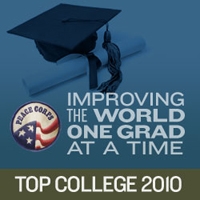Editor’s Note: The following is a Peace Corps news release that is not available on the Peace Corps site. A more general release (pdf) about the Peace Corps “Top Colleges” list for 2010 is available there.

This year, University of Washington holds the top rank for large schools with 101 currently serving Peace Corps volunteer undergraduate alumni. This is the fourth year in a row that the University of Washington has taken the top spot. In the medium school category, The George Washington University ranks number one for the second year in a row with 53 undergraduate alumni serving. For small schools, St. Olaf ranks highest, with 26 currently serving undergraduate alumni volunteers. This is the first time that St. Olaf has topped the small school category since the Peace Corps began ranking the schools based on enrollment in 2003.
“For nearly 50 years, enthusiastic college alumni have contributed to the success of Peace Corps programs and our mission to promote world peace and friendship in host communities around the world,” said Peace Corps Director Aaron S. Williams. “Peace Corps service is a life changing leadership opportunity and a great career foundation in almost every field, ranging from international development, education, public health, engineering, agriculture, and law, to name a few. I am proud of our historic relationship with over 3,000 colleges and universities in the United States and look forward to recruiting and training the next generation of Peace Corps volunteers.”
The Peace Corps ranks its top volunteer-producing schools annually according to the size of the student body. Small schools have less than 5,000 undergraduates, medium-sized schools have between 5,000 and 15,000 undergraduates and large schools have more than 15,000 undergraduates. The rankings are calculated based on fiscal year 2009 data as of September 30, 2009 as self-reported by Peace Corps volunteers.
Currently, there are 7,671 Peace Corps volunteers serving in 76 host countries around the world. A college degree is not mandatory for service. Relevant experience in areas such as education, health, business, IT, environment, and agriculture, however, is required. In 2009, Peace Corps received over 15,000 applications, an 18 percent increase over 2008. This is the largest number of applications since the agency began electronically recording them in 1998.
In 2009, New Hampshire was among the nation’s top Peace Corps volunteer-producing states per capita, ranked as No. 15 nationwide. Forty-six (46) currently serving volunteers are from New Hampshire and 1,532 Granite State residents have served since 1961.
The Peace Corps provides both tangible benefits and a life-defining leadership experience. Peace Corps volunteers return from service as global citizens and receive support from the Peace Corps in the form of career services, graduate school opportunities, advantages in federal employment, readjustment allowances, and loan deferment and cancellation opportunities.
As the Peace Corps approaches its 50th anniversary, its service legacy continues to promote peace and friendship around the world with 7,671 volunteers serving in 76 host countries. Historically, nearly 200,000 Americans have served with the Peace Corps to promote a better understanding between Americans and the people of 139 host countries. Peace Corps volunteers must be U.S. citizens and at least 18 years of age. Peace Corps service is a 27-month commitment. To learn more about the Peace Corps, please visit our website: www.peacecorps.gov.

